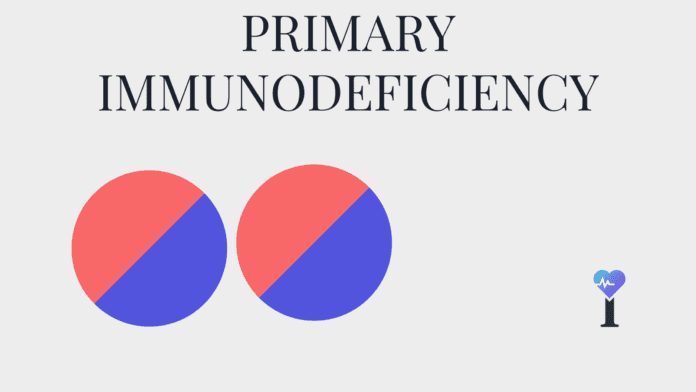Overview Of Primary Immunodeficiency
Primary immunodeficiency disorders occur when the body’s immune response is reduced or absent.
Commonly Associated With
Immunosuppression; Immunodepressed – immunodeficiency; Immunosuppressed – immunodeficiency; Hypogammaglobulinemia – immunodeficiency; Agammaglobulinemia – immunodeficiency
Causes Of Primary Immunodeficiency
The immune system is made up of lymphoid tissue in the body, which includes:
- Bone marrow
- Lymph nodes
- Parts of the spleen and gastrointestinal tract
- Thymus
- Tonsils
- Proteins and cells in the blood are also part of the immune system.
The immune system helps protect the body from harmful substances called antigens. Examples of antigens include bacteria, viruses, toxins, cancer cells, and foreign blood or tissues from another person or species. When the immune system detects an antigen, it responds by producing proteins called antibodies that destroy the harmful substances. The immune system response also involves a process called phagocytosis. During this process, certain white blood cells swallow and destroy bacteria and other foreign substances. Proteins called complement help with this process. Primary immunodeficiency disorders may affect any part of the immune system. Most often, these conditions occur when special white blood cells called T or B lymphocytes (or both) do not function normally or your body does not produce enough antibodies.
Inherited immunodeficiency disorders that affect B cells include:
- Hypogammaglobulinemia, which usually leads to respiratory and gastrointestinal infectionsAgammaglobulinemia, which results in severe infections early in life, and is often deadlyInherited immunodeficiency disorders that affect T cells may cause repeated Candida (yeast) infections. Inherited combined immunodeficiency affects both T cells and B cells. It may be deadly within the first year of life if it isn’t treated early.
- People are said to be immunosuppressed when they have an immunodeficiency disorder due to medicines that weaken the immune system (such as corticosteroids). Immunosuppression is also a common side effect of chemotherapy given to treat cancer.
- Acquired immunodeficiency may be a complication of diseases such as HIV/AIDS and malnutrition (especially if the person does not eat enough protein). Many cancers may also cause immunodeficiency.
- People who have had their spleen removed have an acquired immunodeficiency, and are at higher risk for infection by certain bacteria that the spleen would normally help fight. People with diabetes are also at higher risk for certain infections.
- As you get older, the immune system becomes less effective. Immune system tissues (especially lymphoid tissue such as the thymus) shrink, and the number and activity of white blood cells drop.
The following conditions and diseases can lead to primary immunodeficiency disorder:
- Ataxia-telangiectasia
- Complement deficiencies
- DiGeorge syndrome
- Hypogammaglobulinemia
- Job syndrome
- Leukocyte adhesion defects
- Agammaglobulinemia
- Wiskott-Aldrich syndrome
Symptoms Of Primary Immunodeficiency
Your health care provider might think you have an immunodeficiency disorder if you have:
Infections that keep coming back or do not go away
Severe infection from bacteria or other germs that do not usually cause severe infection.
Other signs include:
- Poor response to treatment for infections
- Delayed or incomplete recovery from illness
- Certain types of cancers (such as Kaposi sarcoma or non-Hodgkin lymphoma)
- Certain infections (including some forms of pneumonia or repeated yeast infections)
- Symptoms depend on the disorder. For example, those with decreased levels of IgA combined with low levels of certain IgG subclasses are likely to have problems involving the lungs, sinuses, ears, throat, and digestive tract.
Exams & Tests
Tests used to help diagnose an immunodeficiency disorder may include:
- Complement levels in the blood, or other tests to measure substances released by the immune system
- HIV test
- Immunoglobulin levels in the blood
- Protein electrophoresis (blood or urine)
- T (thymus-derived) lymphocyte count
- White blood cell count
Treatment Of Primary Immunodeficiency
The goal of treatment is to prevent infections and treat any disease and infections that do develop.
If you have a weakened immune system, you should avoid contact with persons who have infections or contagious disorders. You may have to avoid people who have been vaccinated with live virus vaccines within the past 2 weeks.
If you develop an infection, your provider will treat you aggressively. This may involve long-term use of antibiotics or antifungal drugs to prevent infections from coming back.
Interferon is used to treat viral infections and some types of cancer. It is a medicine that makes the immune system work better.
Persons with HIV/AIDS may take combinations of drugs to reduce the amount of HIV in their immune systems and improve their immunity.
People who are going to have a planned spleen removal should be vaccinated 2 weeks before the surgery against bacteria such as Streptococcus pneumonia and Haemophilus influenzae. People who haven’t been previously vaccinated or have no known immunity should also receive the MMR, and chickenpox vaccines. In addition, it is also recommended that people get the DTaP vaccine series or a booster shot as needed.
Bone marrow transplants may be used to treat certain immunodeficiency conditions.
Passive immunity (receiving antibodies produced by another person or animal) may sometimes be recommended to prevent illness after you have been exposed to certain bacteria or viruses.
People with low or absent levels of certain immunoglobulins may be helped with intravenous immunoglobulin (IVIG), given through a vein.



